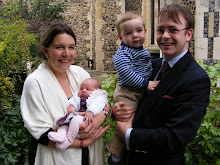Yesterday evening we had a session at the Cathedral on Presiding at the Eucharist, led by the Canon Precentor. Inevitably, one didn't quite agree with everything. But there were some very interesting snippets from a man who knows his liturgical history.
Following confession in most Anglican services, the minister's absolution/assurance of forgiveness has two forms - Lord have mercy upon you, or upon us. Which to use?
In most of the evangelical churches I've been in, us is preferred. It shows the minister includes himself with the congregation as a sinner in need of forgiveness. And the assumption is that they you form is a bit too Catholic.
How ironic then, to discover last night, that the us form is an innovation the Church of England has borrowed from Rome!
In the 1960s (isn't it always?), the Vatican introduced the us form. They were concerned that the number of penitents attending confession was falling, and they wanted to make clear that the "absolution" offered in corporate worship was of a lesser order than the real absolution given by the priest in the sacrament of penance.
Now, of course we don't believe in the sacrament of penance, nor that the presbyter has that sort of power of absolution. However, the Reformed have always believed in the power of the keys - that the ordained ministers of the church are given the authority to declare Christ's forgiveness to the people. So it would be perfectly in order, and not at all Roman, for an evangelical minister to pronounce after corporate confession,
The Lord have mercy upon YOU.
Thursday, 12 June 2008
Subscribe to:
Post Comments (Atom)

1 comment:
Thank you for this. Many Anglican evangelicals appear to have forgotten the Prayer Book at this point (which is ironic, given that they're the ones who make the most noise about being the authentic Anglicans).
I don't know if you've ever listened to any Doug Wilson sermon recordings from Canon Press. On the recording is the prayer of confession and the absolution, and he makes it clear that as their minister he has the authority to pronounce that their sins are forgiven, which he then proceeds to do. I suggest that this practice has an important part to play in assurance.
Do you think this is sort of similar to the blessing at the end. Is the minister praying "May God bless us" or is he declaring God's blessing - "The Lord bless you"? This also links with your post on hand-gestures. Does the minister, like most evangelicals, clasp his hands behind is back or in front of him, or does he raise them towards the congregation? I am reliably informed Doug Wilson does the latter. Again, I think it is an important symbolic act, communicating to the people what is going on.
Post a Comment